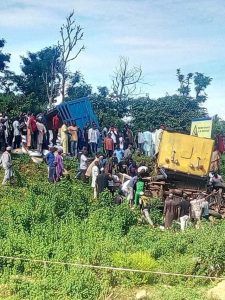This accident is no longer news. All the details about it are already everywhere on Facebook. It happened on September 15th, 2019 and the dead have already been buried. Some people may even say that worse accidents in terms of number of people involved have happened elsewhere. None of that is disputed here. Still, it is the position of Intervention that this accident is the most symbolic of the danger Nigeria faces from the oddity of the primitivity of almost what it has to offer, to the extent that it has any: from dilapidated schools to hospitals to road networks to universities and what have you at a time much of the rest of the world is making so much material progress.
For that reason, it is a good starting point for deconstructing and nationalizing it, believing that if this doesn’t compel Nigerians to reflect, then nothing else might. This is, therefore, beyond personal sympathy for the family which must, understandably, be so devastated by the accident involving mother and three children, all at a go. What manner of country is this?
Those who promote the theology of predestination would say that the accident must have happened in fulfillment of what God must have put down for the victims on their creation day. That is not the subject for disputation here just as that argument ignores the grander truth that God gave human beings the task of controlling and dominating the world. We would probably need a higher theological authority to clarify this.
 While waiting for such clarification, the point must be made that this and all similar accidents are not just the tragedy of the families involved but the eternal shame of a nation. It is a shame that, in the 21st century, the roads would be so narrow as to be a key condition of possibility for this sort of thing. Yet, what the police, the Road Safety Corp and the sundry traffic management establishment ask the typical road user are the pack of documents that shows the roadworthiness of his or her vehicle. To borrow the applicable folk logic here, how do you ask for road worthiness of vehicles when the roads are themselves unworthy? Year – in, year – out, successive presidents and ministers of works, FERMA and the experts milling around oil rents in government ministries design road outlays that are just dammed too primitive for a country of Nigeria’s road traffic profile. And when the inevitable happens, everyone says it is God’s work. How could that be?
While waiting for such clarification, the point must be made that this and all similar accidents are not just the tragedy of the families involved but the eternal shame of a nation. It is a shame that, in the 21st century, the roads would be so narrow as to be a key condition of possibility for this sort of thing. Yet, what the police, the Road Safety Corp and the sundry traffic management establishment ask the typical road user are the pack of documents that shows the roadworthiness of his or her vehicle. To borrow the applicable folk logic here, how do you ask for road worthiness of vehicles when the roads are themselves unworthy? Year – in, year – out, successive presidents and ministers of works, FERMA and the experts milling around oil rents in government ministries design road outlays that are just dammed too primitive for a country of Nigeria’s road traffic profile. And when the inevitable happens, everyone says it is God’s work. How could that be?
Being so structurally narrow rules out the possibility of demarcating the roads according to vehicular or speed ranges. That means cars, buses, trailers and all other manners of ‘lagbaja’ vehicles are all struggling to establish right of way on the approved death tracks called highways across most of Nigeria.
Above all, this is a country where laws have no meaning. Drivers especially of trucks that do not obey basic traffic rules or are most often times too wicked in road practices do not get punished. Those from Julius Berger and other construction giants are most guilty of this. They manifest the road dimension of power relations in the country. The elite dimension of this is stealing the allocation for road projects without that being detected or punished in a transparent manner if ever detected.
So, ghastly road accidents happen not from one single reason but a combination of some of these reasons. It will continue to happen like that as long as everyone keeps invoking God whenever it happens. It will also continue to happen, not only on the road but in security, in water supply, in terms of standard hospitals and in just about every other sector of the society as long as the quality of elections remain what it is today in Nigeria. As long as that is so, then those with the political education and technical sophistication to manage change are kept out by the thugs and cabals.
The question may also be asked in relation to this and similar accidents on the Abuja – Benue State – Eastwards Federal Highway: what does the Middle Belt ever ask from any government in Nigeria? In particular, what was the Middle Belt up to when they supported Dr. Goodluck Jonathan’s candidature for the presidency when it was a debate? What was so impossible in a snappy award of contract for a thorough modernization of a route leading to the Middle Belt itself, the East and the Southsouth, (Calabar, Akwa Ibom) under that government that the Middle Belt fought for? Does the region fight for power for the sake of fighting? And what is the Middle Belt’s shopping list from this government now especially on this route or is politics not negotiation?




























